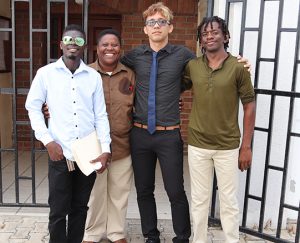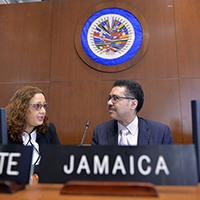| CASE NAME | MINISTER VOOR IMMIGRATIE EN ASIEL v. X,Y AND Z |
| COUNTRY | Netherlands |
| COURT/ TRIBUNAL | Court of Justice of the European Union |
| STATUS | Judgment delivered |
Summary
This was a request for a preliminary ruling from the Raad van State (Council of State) of the Netherlands, concerning the interpretation of Article 9(1)(a) of the EU Council Directive on minimum standards for the qualification and status of third-party nationals as refugees. The case involved applications for refugee status in the Netherlands by gay men from Sierra Leone, Senegal and Uganda, who feared persecution on the basis of their sexual orientation.
Case Details
The Raad van State (Council of State) of the Netherlands sought a preliminary ruling from the Court of Justice of the European Union on the interpretation of Article 9(1)(a) of the EU Council Directive on minimum standards for the qualification and status of third-party nationals as refugees, after three gay men from Sierra Leone, Senegal and Uganda, who feared persecution on the basis of their sexual orientation, sought refugee status in the Netherlands. The Raad van State requested a ruling on three preliminary questions to assist it in assessing their claims for refugee status:
- Whether foreign nationals with a homosexual orientation form a ‘particular social group’, as referred to in the Directive, for the purposes of EU asylum law;
- Whether such persons can be expected to conceal their orientation or exercise restraint in their country of origin in order to avoid persecution;
- Whether the criminalization of homosexual activities and the threat of imprisonment constitute an act of persecution.
The Parties
The request for preliminary ruling was brought by the Minister voor Immigratie en Asiel (Minister for Immigration and Asylum) of the Netherlands.
X, Y and Z are nationals of Sierra Leone, Uganda and Senegal, respectively, and are all gay men who feared persecution if returned to their countries of origin, on the basis of their sexual orientation.
The UN High Commissioner for Refugees (UNHCR) had intervened in the domestic proceedings and was thus permitted to intervene in the CJEU proceedings.
The European Commission and the following EU member states made written and/or oral submissions: France, Germany, Greece, Italy and the United Kingdom.
Applicable Law
| INSTRUMENT | PROVISIONS |
| European Convention on Human Rights | Articles 8 (privacy) and 14 (non-discrimination) |
| Charter of the Fundamental Rights of the European Union | Articles 1 (human dignity) and 18 (right to asylum) |
| EU Directive 2004/83/EC of 29 April 2004 | Article 9 (1) and (2) (c) (definition of persecution) and 10 (1) (d) (definition of particular social group) |
Relief Sought
The request was for a preliminary ruling on the interpretation of Article 9(1)(a) of the EU Council Directive on minimum standards for the qualification and status of third-party nationals as refugees.
The Process
Judgment in the case was delivered on 7 November 2013 finding that:
- Homosexuals form a particular social group for the purposes of the EU Directive;
- Sexual orientation is a characteristic so fundamental to a person’s identity that the persons concerned cannot be required to renounce it. Therefore, an applicant for asylum cannot be expected to conceal his or her homosexuality or exercise restraint in the country of origin in order to avoid persecution;
- The criminalisation of homosexual acts alone does not, in itself, constitute persecution. However, a term of imprisonment which is actually applied in practice in the country of origin does constitute persecution.
The Human Dignity Trust’s Role
The Human Dignity Trust was requested by Dutch counsel for Z to develop and present the legal arguments on question 3. The submissions on this point were made on our behalf by Karon Monaghan QC of Matrix Chambers.
Our position was that even in the absence of enforcement, criminalising consensual same-sex sexual conduct between adults in private has been recognised as tantamount to criminalising a person’s sexual identity, which in turn should be considered persecution by virtue of the inherently pernicious, stigmatising effect of criminalising someone’s identity. Our position was later echoed by in a case comment (pdf) issued jointly by Amnesty International and the International Commission of Jurists.




